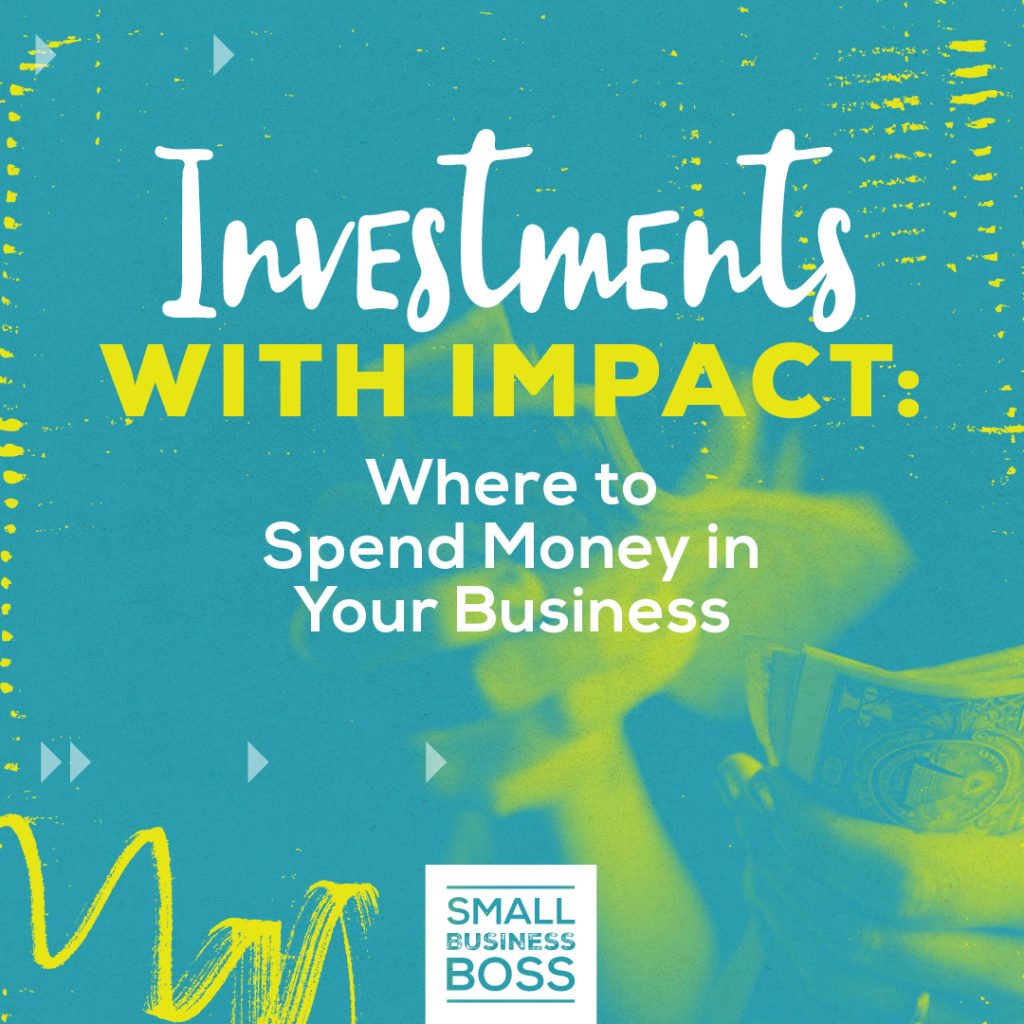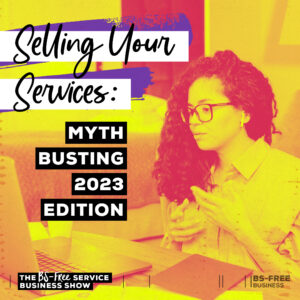
Search the site:
Episode 99: Investments with Impact – Where to Spend Money in Your Business
You need to spend money to make money is one of the most commonly dispensed pieces of business advice. But is it true? Well…not always!
In this episode, we’re looking at investments with impact and where you should (and shouldn’t) spend money in your business.
We’re talking about where to actually spend your money, and let’s be real here…there are some seriously crazy things we hear and see online.
We know you feel us on this as “investing” in your business is typically part of the online marketing pitch. And while it’s true in some cases, it’s a scare tactic in others designed to cause you some serious FOMO.
In a world that’s trying to sell you the best big thing, it’s challenging to know what’s actually a good investment and what’s not.
We wanted to cover this as there’s a lot of complexities when it comes to spending your money in your business, and in many cases, we’ve seen smart people spend way too much money that they could have kept in their pockets.
Here’s your reality check:
When you spend money in your business, unless you have a plan, you’re literally taking money from your own pocket. So many times people pay everyone else but themselves.
When you’re working so hard and not being compensated appropriately, that’s a recipe for resentment. Yet, it’s easy to think this investment will be the RIGHT one that makes all the difference.
So now that we know the problem, how do we fix it?
1. Have a Plan – Set a Budget and Stick To It.
- Have a budget for your investments such as coaches, courses, and programs, along with a line item where you PAY yourself.
- Budgets (and all the bad rap they get) truly are the tools for growth and freedom, especially in your business.
- A budget is a plan for what you expect to happen. It informs your minimum revenue numbers.
- We follow the basic principle from Profit First of Revenue – Profit = Expenses.
To Do Up a Budget:
- You need to know what your baseline is that you are paying yourself (your “salary”) each month. Go thru past statements up to 3-6 months ago, and see what your averages are. (Hint: if you know your rice & beans number, use that for now.)
- Then you need to line item every one of your expenses. People, Tools, Trips, Taxes, Buffer, etc.
- This is where you can put in goal items to see what they would really cost you over the course of say 6 months or a year (a conference you want to go to, a new computer, etc.).
- You want to be able to assign every dollar that comes into your business a “job.” And if it doesn’t have a job yet, put it into your buffer account. Don’t spend money for the sake of spending it. If you haven’t guessed, we love buffers.
- Check-in and track against this budget regularly. Adjust as your revenue does and as your team/resources grow. And before you make ANY “investment,” check the budget.
- Episode 58 goes into more detail on budgets.
2. Watch for the Reverse Latte Factor
- The “latte factor” is the idea that small things you spend money on every single day add up over the course of a year. The concept is that you can cut down on your spending with these small things.
- In business, we see people trying to cut little things all the time, things that they actually need or that will save them time, in an effort to curb expenses.
- While we’re not a fan of paying for things you don’t need, it’s not effective to cut small things or avoid investing in them because you’re doing it to save a few bucks per month.
- Many of these things help you be more professional with your clients, and that helps create a better experience and breeds loyalty.
- Truth: Saving money on client systems or little things is NOT the way to go. The bigger problem with the investments we tend to make is that they are MUCH bigger, they are not planned for, and quite frankly, we don’t get the ROI out of it that we need.
Making Intentional Investments Means You Need to Get ROI
- ROI may not be the sexiest thing, but you know what’s sexy? Keeping your money and bringing it home. That’s exciting stuff!
- So let’s say you’ve got a budget, and you’re okay with spending the money. (It’s not enough to just be okay with the money.) You need to assess the potential ROI of spending that money.
- Questions to ask:
- How much more money will this help me make? (Hint, it should be exponentially more than your investment.)
- How much time will this save? (Again, factor in how much time you need to invest.)
- Once you’re confident you can get real ROI, you need to be able to actually follow through.
- Finally, beware the course that adds to your workload when really you could hire someone to do it for you.
Links for This Show:
- Check out Episode 58 to get more details on how to effectively budget.
- Pick up a copy of Profit First to get some great tips on running a profitable business.

I’m Maggie Patterson (she/her), and services businesses are my business.
I have 20+ years of experience with client services, am a consultant for agency owners, creatives, and consultants, and vocal advocate for humane business practices rooted in empathy, respect, and trust.
Read or Listen to the Latest
For Solo Business Owners

Growing a solo service business is tough.
It’s even harder when you’re bombarded with BS advice that steers you away from your values and why you started your business in the first place.
This is the podcast for solo creatives and consultants who want to remain as a team of one and have zero interest in the hustle and grind of typical business teachings.
Subscribe now and never miss an episode.
For Micro Agency Owners
Most podcasts for agency owners obsess over revenue growth as the ultimate success metric.

But here’s the truth: not everyone wants to make millions. Your goal might be to build a sustainable business that lets you have a life and doesn’t run you into the ground.
Join me as I spill my shameless confessions and share everything I’ve learned about building a micro agency that skips the BS of tired and typical agency teachings.
Follow Now on All Major Podcast Platforms








